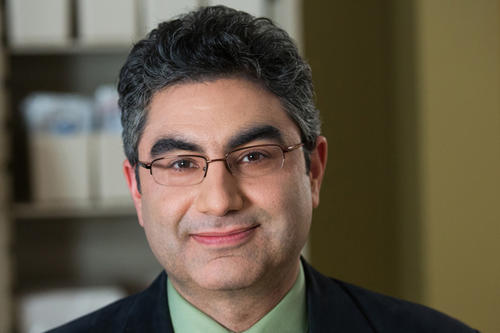
March is National Colorectal Cancer Awareness Month. According to the Minnesota Department of Health, colorectal cancer is the third most diagnosed cancer in the state, when looking at males and females separately, and the second leading cause of cancer-related deaths. Colorectal cancer rates vary by region in Minnesota, with western Minnesota having the highest rates.
Emil Lou, M.D., Ph.D., with the Masonic Cancer Center and University of Minnesota Medical School, answers questions on the symptoms, treatment and screening for colorectal cancer.
Q: What is colorectal cancer?
Dr. Lou: The term colorectal cancer describes all cases of cancer that start in the colon or rectum. The way I usually describe the anatomy to patients is that we eat food that passes through the esophagus, stomach, and onto a long and winding part of the digestive tract called the small intestines, before passing digested remaining portions to the colon and the rectum. As a whole in the U.S., colorectal cancer is the third most common cancer among men and women with nearly 150,000 new cases each year.
Q: What are the symptoms of colorectal cancer and how is it detected?
Dr. Lou: Colorectal cancer is one of the few cancer types for which we have accessible, validated and approved methods of screening in order to find the cancer early. A central purpose of cancer screening is to detect cancers at an earlier stage, hopefully at a point where it is treatable and even curable. Many cases of colorectal cancer can be first found on a colonoscopy. However, in other patients, the cancer may be found when symptoms develop, such as bleeding in the stool, abdominal pain or other concerning symptoms that require further evaluation.
Q: What are the treatment options for colorectal cancer?
Dr. Lou: The treatment options for colorectal cancer are mainly determined by the stage of the cancer. Stage means how far the cancer is from where it began. It is classified as stages 1, 2, 3 or 4. Oncologists still use Roman numerals, so you might see the stage listed as I, II, III or IV.
Cancers that remain contained and small at the time of diagnosis, considered early stage, may be removed by a surgeon. The surgery in those cases is performed with the goal of curing it. The success rate can be very high. When the cancer has escaped into lymph nodes—small sacs that naturally surround our organs and give fluid back to our bloodstream—that means the cancer is a higher stage, often called stage III. In this case, a standard recommendation would be surgery followed by some form of chemotherapy, with the goal of reducing the risk that the microscopic cancer cells can spread and cause the cancer to return in the future. Stage IV is the highest stage and occurs when the cancer has spread to other sites from where it started. Common sites include the liver, lungs and bone. Chemotherapy is the standard recommended treatment. In some cases, if there is very limited spread, surgery may also be offered.
If rectal cancer is found to be contained, or still localized and early stage, then standard care recommendations often include radiation along with chemotherapy prior to surgery. This may be followed by further chemotherapy after surgery.
Q: What is the recommended age to screen for colorectal cancer?
Dr. Lou: There are longstanding expert guidelines that suggest starting colorectal cancer screenings at age 50. One exception to this rule is if you have had a close relative (e.g., parent, sibling) diagnosed with colorectal cancer at a relatively young age. For example, if a parent were diagnosed at age 52, then it would be recommended that that person’s child start colorectal cancer screenings as much as 10 years before the age of the parent’s diagnosis. In this case, age 42. Another exception would be, at any age, if you were to develop unusual symptoms, including abdominal cramps or bleeding in the stool, that—after medical evaluation—could not be explained by any other cause. In that case, colorectal cancer should be at least considered and screened for. With recent reports of more young adults (under 50 years old) being diagnosed with colorectal cancer, there has been more debate in recent memory of whether Americans should consider screening sooner than age 50. In the years to come, we may well see recommendations for screening at earlier ages.
Q: What are you doing to advance colorectal cancer research?
Dr. Lou: In addition to treating patients with gastrointestinal cancers at the Masonic Cancer Center, I am a researcher. I lead a laboratory that investigates colorectal cancers at the cellular and molecular levels, with the goal of trying to figure out how these cancer cells communicate with each other and how this communication is vital to growth of tumors. If this communication is truly as critical as we believe, then stopping or interfering with it would be a unique way we can halt tumor growth and stop colorectal cancers. I also lead efforts to integrate new technologies, such as application of molecular diagnostics, to understand new ways we can treat patients. In several ongoing studies with collaborators at the University of Minnesota and the National Institutes of Health, we are examining new molecular changes discovered in tumors from patients treated at the University. We believe some of these mutations may give us better insight into what drives the formation of colorectal cancers and why some forms are more resistant to treatment. Above all, my team and I are dedicated to advancing colorectal cancer research because we owe it to all patients—past, current and future—to find ways to better treat this cancer and aim for cures.
Dr. Emil Lou is an assistant professor in the University of Minnesota Medical School and Masonic Cancer Center member. His areas of expertise include colorectal, pancreatic, esophageal and gastric cancers.
- Categories:
- Health




